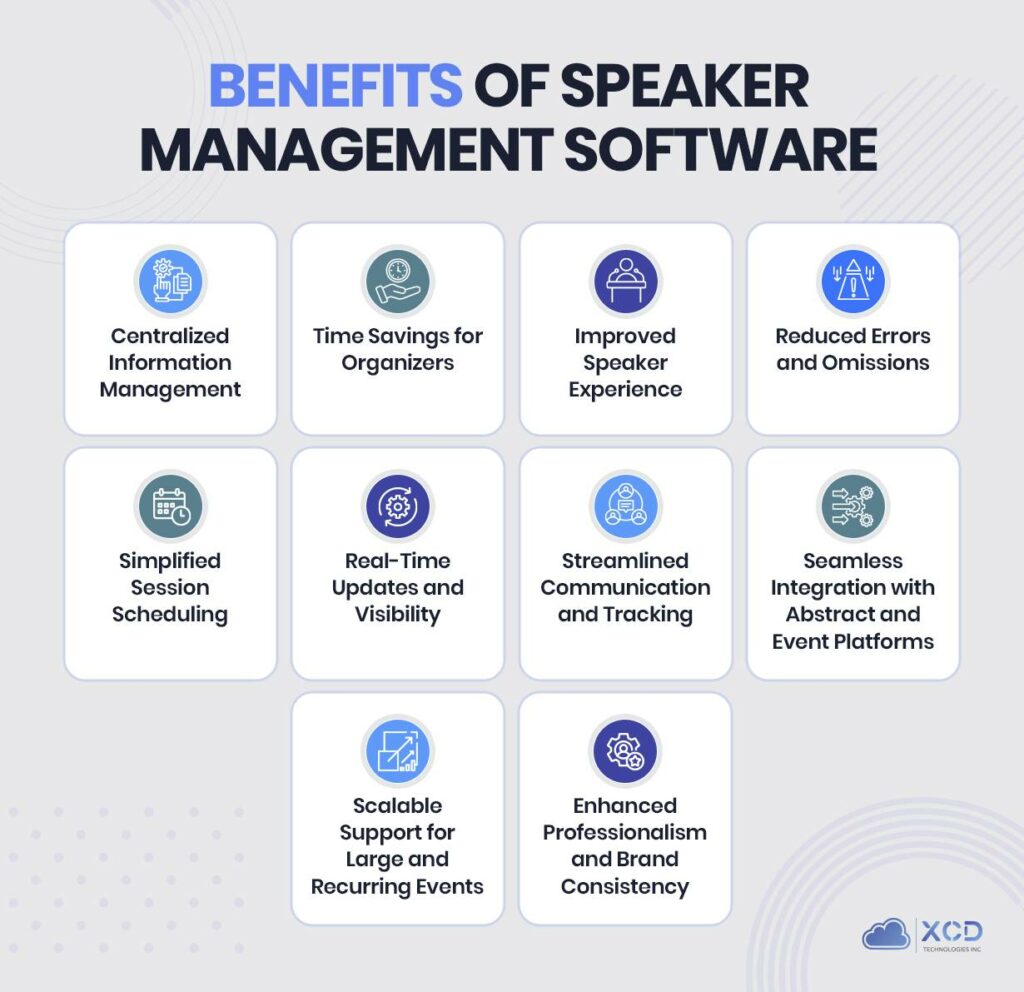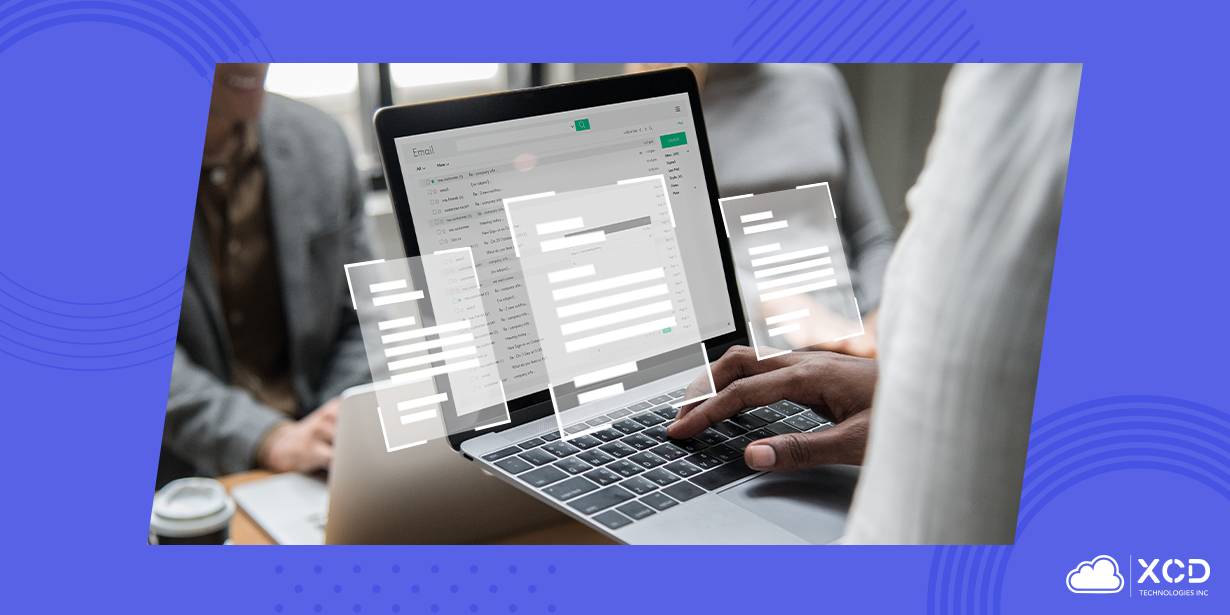Picture this: It’s 2 AM, and you’re frantically scrolling through seventeen different Excel spreadsheets, trying to figure out why Dr. Martinez’s bio is missing, whether Professor Chen submitted her conflict of interest form, and if anyone remembered to ask the keynote speaker about dietary restrictions.
Sound familiar?
If you’ve ever found yourself drowning in speaker coordination chaos, you’re not alone.
Every conference organizer has been there—juggling dozens of speakers, chasing down missing documents, and wondering why “reply all” emails seem to multiply exponentially.
Managing speakers for academic and scientific conferences is about delivering a seamless, professional experience from invitation to presentation. But without the right tools, you’re stuck juggling spreadsheets, endless email threads, and last-minute surprises that put your reputation at risk.
Whether you’re coordinating dozens of invited speakers or managing complex session schedules, the right speaker management software helps you stay organized, reduce back-and-forth, and ensure every speaker feels like a VIP.
From disclosure forms and presentation uploads to bio approvals and travel coordination, speaker expectations are high, and your tools need to rise to meet them.
If you’re evaluating speaker management software, this guide will help you choose a platform that supports your team, satisfies your speakers, and keeps your conference running smoothly.
What is Speaker Management Software?
Speaker management software is a specialized platform designed to streamline and automate the entire lifecycle of speaker coordination for conferences and other events.
At its core, speaker management software serves as a centralized hub where you can manage speaker profiles, track communication, coordinate session assignments, and collect required information.
This software typically includes features for speaker onboarding, abstract integration, scheduling coordination, and asset collection, eliminating the manual overhead that consumes so much of your valuable time.
What are the Main Features to Look For in Speaker Management Software?
Choosing the right speaker management software means finding a solution that simplifies coordination, enhances the speaker experience, and supports your unique event requirements.
So, whether you’re moving on from spreadsheet chaos or upgrading from a less-than-ideal speaker management software, here’s what to look for:
Multi-Year Speaker Database
A built-in multi-year database functions as a powerful archive, preserving speaker records, session histories, evaluations, and communication logs across every event cycle.
Instead of losing valuable context at the end of each conference, this feature creates a centralized, long-term reference that organizers can easily revisit year after year. It’s like having institutional memory that doesn’t retire, quit, or forget where they put important documents.
Whether you’re looking to reconnect with a high-performing speaker, analyze topic trends over time, or compare evaluation data from past events, a multi-year archive ensures you’re not starting from zero.
Plus, it supports the continuity that makes your conference feel professional and established, not like you’re reinventing the wheel every single time.
Advanced Reporting Capabilities
Robust reporting capabilities are essential for measuring the success of your speaker program and making data-driven improvements.
Your speaker management software should provide detailed analytics on speaker demographics, session attendance, evaluation scores, and engagement metrics.
Effective reporting features include customizable dashboards, automated report generation, and the ability to track key performance indicators specific to your conference goals.
This data becomes crucial for justifying speaker budgets, demonstrating value to stakeholders, and continuously improving your speaker selection and management processes.
Evergreen Speaker Profiles
What if speakers didn’t have to fill out the same forms every year, but could simply update what’s changed and move on?
Quality speaker management software supports evolving speaker profiles while retaining key details, such as contact information, presentation history, speaking preferences, technical and accessibility requirements, and professional development.
By eliminating repetitive data entry, evergreen profiles let speakers focus on their content instead of administrative tasks.
For organizers, this continuity makes it easier to reconnect with past speakers and match them to future sessions without starting from scratch.
Seamless System Integration
If your new speaker management software can’t work with your existing tools, you’ve just created a very expensive digital island.
Integration capabilities are perhaps the most critical feature to evaluate. Your speaker management software should connect seamlessly with your abstract management system, peer review processes, event registration, and other conference management tools.
This integration ensures that speaker information flows seamlessly between systems, reducing data entry errors and streamlining the whole event management process.
Look for platforms that can sync speaker assignments with abstract acceptance decisions, automatically populate registration records, coordinate with continuing education tracking systems, and more.
Automated Asset Collection
How many times have you sent a “friendly reminder” email about missing presentation materials? If you’ve lost count, this feature is about to become your new best friend.
Managing presentation materials, handouts, and other speaker assets is a perennial challenge for conference organizers. Quality speaker management software should automate this process with built-in asset collection workflows, file versioning, and deadline management.
Your management software should be able to send automated reminders for missing materials, validate file formats and sizes, and organize assets by session or track for easy distribution to participants.
Additionally, advanced systems also provide preview capabilities and can integrate with presentation management tools for seamless day-of-event execution.
Comprehensive Compliance Management
When audit time comes around, you want to be the organizer who smiles confidently and says, “Of course, we have all the documentation. Would you like it sorted by date or speaker name?”
Academic conferences require careful management of conflict of interest disclosures, speaker agreements, and compliance documentation. Your software should provide structured workflows for collecting, reviewing, and storing these critical documents.
Look for features that can automatically flag potential conflicts, track agreement completion status, and provide audit trails for compliance purposes.
Your management system should also be able to generate standardized disclosure forms and speaker agreements based on your organization’s specific requirements.
Intelligent Session Building
The best sessions happen when complementary speakers, relevant topics, and engaged audiences all come together, and that’s easier said than done, unless you have the right tools.
Creating balanced, engaging conference sessions requires careful consideration of speaker expertise, audience interests, and logistical constraints. Quality speaker management software includes session builder tools that help you optimize these complex decisions.
These tools should allow you to visualize potential session combinations, identify gaps in coverage, and ensure appropriate speaker diversity across your program.
Advanced session builders can also consider factors such as speaker availability, travel constraints, and historical attendance data to optimize session planning.
Advanced Scheduling Management
If you’ve ever tried to schedule speakers across multiple time zones, priorities, and session types, you know it can feel like an impossible puzzle with constantly shifting pieces.
That’s why your speaker management software should offer sophisticated tools for conflict detection and resolution. Look for systems that automatically identify overlaps, suggest alternatives, and provide real-time visibility into speaker availability.
The right platform should also handle the complex scheduling needs of academic conferences, including poster sessions, workshop rotations, and multi-day symposiums.
Interactive Speaker Directory
A comprehensive speaker directory serves multiple purposes: helping attendees identify relevant presentations, facilitating networking opportunities, and showcasing your conference’s expertise to potential participants. Your speaker management software should be able to generate and maintain these directories automatically.
The directory should be customizable to highlight different speaker credentials, searchable by expertise area or affiliation, and easy to update as speaker information changes. Plus, integration with mobile apps and conference websites ensures that this valuable resource is readily accessible to your entire community.
What are the Benefits of Using Speaker Management Software?
Speaker management software offers numerous advantages for conference planners.

Centralized Information Management
Speaker management software serves as a single source of truth for all speaker-related data. With accurate, up-to-date records, event planners can collaborate more effectively, reduce communication errors, and maintain a complete audit trail of every interaction.
Time Savings for Organizers
Automation eliminates time-consuming manual tasks, freeing up your time to focus on higher-level event planning. From automated reminders to compliance tracking, the software streamlines processes that would otherwise require hours of effort.
Improved Speaker Experience
Speakers benefit from a clear, easy-to-use interface that simplifies participation. With self-serve tools for profile updates and resource uploads, speakers gain full visibility into expectations, leading to better preparedness and higher satisfaction.
Reduced Errors and Omissions
Built-in validations and systematic workflows help prevent mistakes. Speaker management software flags missing information, enforces data formatting, and ensures nothing slips through the cracks, so your sessions run smoothly.
Simplified Session Scheduling
Smart scheduling tools help create balanced, engaging agendas. By detecting conflicts, suggesting session groupings, and supporting conference goals, speaker management platforms help you build a better program with less guesswork.
Real-Time Updates and Visibility
In a fast-paced conference environment, information needs to move quickly. Speaker updates are instantly visible to event organizers, helping you respond to changes in real-time and avoid disruptions caused by outdated data.
Streamlined Communication and Tracking
Automated communication workflows ensure timely outreach and clear tracking of speaker responses. With everything organized in one place, you can maintain professional, consistent messaging while easily monitoring progress and compliance.
Seamless Integration with Abstract and Event Platforms
Speaker management software connects smoothly with your abstract system and event tools. This integration eliminates double entry, reduces inconsistencies, and provides a unified view of your entire conference workflow.
Scalable Support for Large and Recurring Events
Whether you’re running a 500-person symposium or an annual 10,000-attendee congress, the software adapts to your scale. This management platform retains historical data for future event planning and supports multiple conferences.
Enhanced Professionalism and Brand Consistency
A polished speaker experience reflects well on your organization. With consistent branding, streamlined communications, and reliable tools, you elevate your reputation among speakers and participants alike.
What are the Common Mistakes to Avoid when Choosing Speaker Management Software?
Let’s talk about the pitfalls that can turn your software solution into an expensive headache.
Overlooking Integration Capabilities
A system that can’t communicate with your abstract management, registration, and other conference platforms will create more problems than it solves. Before deciding:
- Map out your complete conference management ecosystem
- Ensure seamless integration with existing tools
- Consider future expansion plans
Ignoring the Speaker Experience
Focusing only on internal benefits while neglecting speaker experience can undermine your entire conference program. Complex, unintuitive interfaces lead to missed deadlines and incomplete submissions. Always:
- Request demo access to speaker portals
- Test typical speaker workflows
- Evaluate mobile responsiveness and navigation clarity
Not Testing the Platform First
Never select software based solely on vendor demonstrations. The gap between demos and real-world usage can be significant. Instead:
- Insist on hands-on trial periods with realistic scenarios
- Test both internal workflows and speaker-facing interfaces
- Ensure the platform meets all stakeholder needs
Assuming One Size Fits All
Academic conferences have unique requirements around peer review integration, continuing education tracking, and compliance management that generic event tools often lack. Make sure your platform:
- Is designed specifically for academic conferences
- Can be configured for your specific requirements
- Includes specialized features for scientific meetings
Skipping Security and Compliance Checks
Academic conferences handle sensitive personal data, financial details, and proprietary research information. Always verify that platforms:
- Meet relevant security standards and data protection requirements
- Accommodate your specific compliance needs
- Address international privacy regulations and institutional policies
Failing to Plan for Hybrid or Virtual Needs
Even primarily in-person conferences often include virtual event elements. Selecting software that only supports traditional events limits future flexibility. Ensure your platform can handle:
- Virtual presentations and hybrid participation models
- Remote speaker coordination
- Flexible event formats for future evolution
Get All-In-One Speaker Management Software with X-CD
Instead of juggling multiple systems for speaker coordination, abstract management, and registration, you can connect everything in X-CD’s integrated platform.
When abstracts are accepted, information automatically pulls into speaker management workflows, keeping all details synchronized and eliminating data inconsistencies within our speaker management software.
Additionally, our software simplifies speaker coordination with tools to help you:
- Collect and manage disclosures, copyrights, and conflict-of-interest forms
- Set and track AV needs and accessibility requirements
- Gather bios, headshots, and other speaker materials
- Automate personalized email communications and reminders
- Maintain evergreen speaker profiles to reduce repetitive data entry
- And more!
Ready to streamline your speaker management? Request a demo today and see how X-CD can reduce your administrative burden and help you create more successful conferences. Your future self will thank you.



